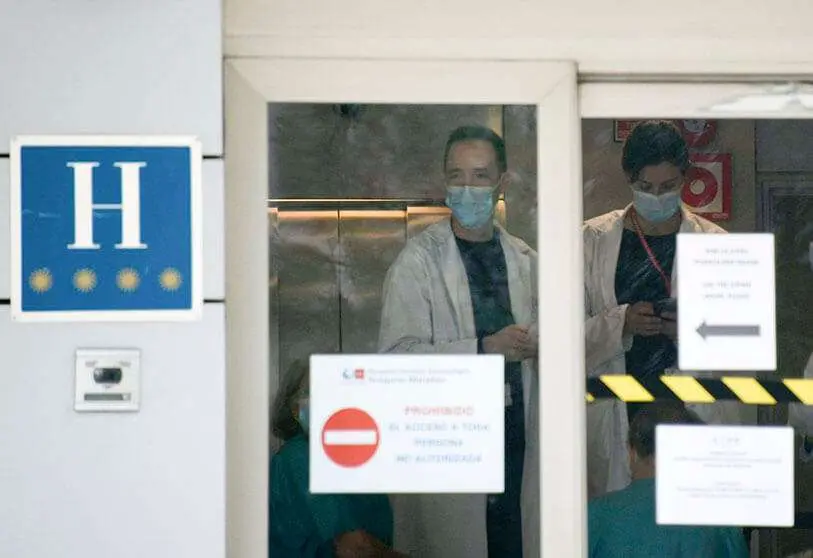Irregular health care workers against COVID-19

There is a lack of health care workers in Spain. Staff shortages have led some autonomous communities, such as Catalonia, to hire students and retirees. The measure is understandable because of the urgency of the situation, but it puts retired health workers at risk. According to the technical report from the Centre for the Coordination of Emergencies and Health Alerts, in a study at a hospital in Madrid "the proportion of infection among health professionals in contact with COVID-19 patients was similar to that of those who had no contact". It is admirable that retired professionals decide to return to work voluntarily, but it is an unnecessary risk considering that there are plenty of qualified personnel in our country.
"Let the authorities know that we are prepared, that we have experience, that we are ready to fight and to give our all for this country, which is also our country." This is the end of the video in which a group of immigrants with health training offers their help to fight the pandemic. The group includes doctors, nurses and nursing assistants, most of whom cannot practise in Spain because their qualifications are not recognised - a long, complicated and costly process - or because they are in an irregular situation. They all wish to contribute to the fight against the pandemic with their knowledge and experience, but are forced to stay at home and watch helplessly. The group has also created an online petition asking the Government for urgent regularisation, although so far it has not surpassed 500 signatures.
Of course, regularising immigrants and recognising foreign qualifications is something that should normally be done very carefully. But the exceptional situation we are experiencing, with a significant percentage of health workers on sick leave and a shortage of staff, requires measures that are commensurate with the circumstances. No doubt the students who are being recruited these days will work hard and learn a great deal, but perhaps it would be better to employ people who already have training. Many lives are at stake, and it is a pity that hundreds of professionals cannot help in this struggle because of bureaucratic and administrative issues. There was already a lack of health care personnel before the pandemic, especially in "empty Spain" - a year ago the press reported on two Venezuelan doctors living in Soria who were unable to practice because of the administration's delay in recognising their qualifications, even though the hospital urgently needed specialists in neonatology and intensive medicine like them - but the situation is much more dramatic now.
Fortunately, it seems that the government is taking steps in this direction. At the end of March, the Ministry of Labour announced the incorporation into the National Health Service of 202 non-EU professionals "in a regular situation" in Spain, as well as the speeding up of the procedures for recognising the qualifications of healthcare personnel trained abroad. Other countries, such as Italy, Germany and the United Kingdom have adopted similar measures. By mid-April, Spain had already recognised the qualifications of a thousand people; the main beneficiaries - in addition to society as a whole - are nurses and nursing assistants of Latin American origin, especially Colombians, Venezuelans and Argentines. The measure, which has required the extraordinary coordination of three ministries, includes asylum seekers and immigrants with residence permits without the right to work, but excludes irregular immigrants and therefore leaves out hundreds of people with health training.
Hundreds of health professionals with irregular migration status, such as the people behind the aforementioned video and petition, have expressed on social networks their desire to collaborate in this crisis - after all, many were trained as health professionals by vocation - and their helplessness at not being able to help at a critical moment. The message is simple but powerful: "I am an immigrant, I am part of this society, and I want to help combat COVID-19".
Many of these immigrants perform unrecognized but critical health care tasks, such as caring for the elderly. Others, although not health professionals, also help keep our society afloat, whether it is by working the land as seasonal workers in precarious conditions, cleaning and disinfecting hospitals, nursing homes and public buildings, or distributing products to shops, supermarkets and homes. In addition, irregular immigrants contribute to the public coffers through the payment of indirect taxes -VAT-, a contribution that could be higher if they were to contribute legally. Above and beyond this utilitarian vision - immigrants are convenient for us now because there is a lack of health care personnel - we must take into account that integration and the feeling of belonging to a country go beyond what is strictly legal.
Spain is all of us who live and have loved ones here, regardless of our place of birth or our nationality. We are all part of this society; we will all, to a greater or lesser extent, suffer the consequences of the pandemic, and together we will all contribute to overcoming this situation. The virus does not discriminate, nor should our response. It is in times of crisis that societies show their true colours. This month and a half of confinement has left us with great signs of civic responsibility and collective solidarity. The offer of the health workers in an irregular situation, who have not only shown their willingness to collaborate in the face of the pandemic, but have also exposed themselves to being reported and deported - since in the video and on the social networks they reveal their faces and state their names - is a huge and very emotional gesture of love for Spain and the Spanish people. I hope it is not in vain.

